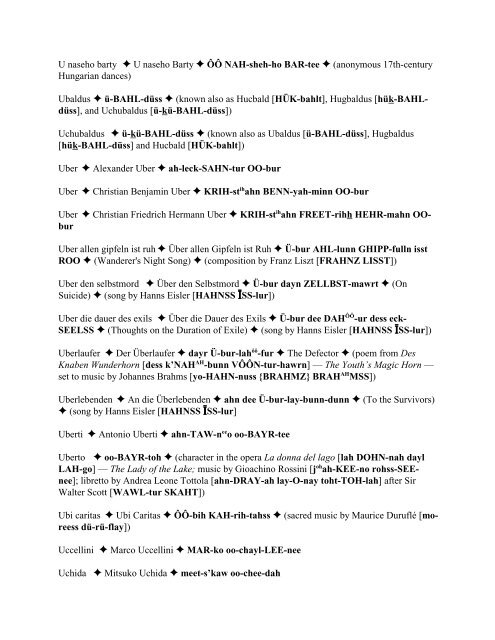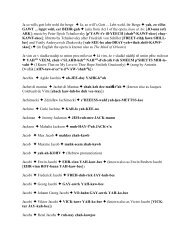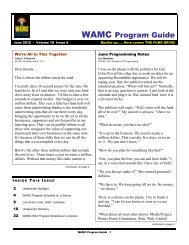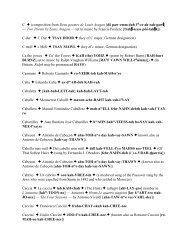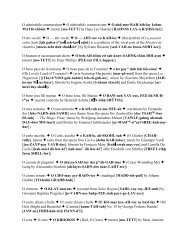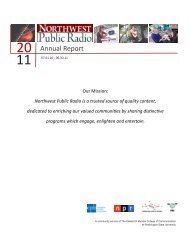U naseho barty C U naseho Barty C ÔÔ NAH-sheh-ho BAR-tee C ...
U naseho barty C U naseho Barty C ÔÔ NAH-sheh-ho BAR-tee C ...
U naseho barty C U naseho Barty C ÔÔ NAH-sheh-ho BAR-tee C ...
Create successful ePaper yourself
Turn your PDF publications into a flip-book with our unique Google optimized e-Paper software.
U <strong>nase<strong>ho</strong></strong> <strong>barty</strong> C U <strong>nase<strong>ho</strong></strong> <strong>Barty</strong> C <strong>ÔÔ</strong> <strong>NAH</strong>-<strong>sheh</strong>-<strong>ho</strong> <strong>BAR</strong>-<strong>tee</strong> C (anonymous 17th-century<br />
Hungarian dances)<br />
Ubaldus C ü-BAHL-düss C (known also as Hucbald [HÜK-bahlt], Hugbaldus [hük-BAHLdüss],<br />
and Uchubaldus [ü-kü-BAHL-düss])<br />
Uchubaldus C ü-kü-BAHL-düss C (known also as Ubaldus [ü-BAHL-düss], Hugbaldus<br />
[hük-BAHL-düss] and Hucbald [HÜK-bahlt])<br />
Uber C Alexander Uber C ah-leck-SAHN-tur OO-bur<br />
Uber C Christian Benjamin Uber C KRIH-st ih ahn BENN-yah-minn OO-bur<br />
Uber C Christian Friedrich Hermann Uber C KRIH-st ih ahn FREET-rihh HEHR-mahn OObur<br />
Uber allen gipfeln ist ruh C Über allen Gipfeln ist Ruh C Ü-bur AHL-lunn GHIPP-fulln isst<br />
ROO C (Wanderer's Night Song) C (composition by Franz Liszt [FRAHNZ LISST])<br />
Uber den selbstmord C Über den Selbstmord C Ü-bur dayn ZELLBST-mawrt C (On<br />
Suicide) C (song by Hanns Eisler [HAHNSS SS-lur])<br />
Uber die dauer des exils C Über die Dauer des Exils C Ü-bur dee DAH <strong>ÔÔ</strong> -ur dess eck-<br />
SEELSS C (T<strong>ho</strong>ughts on the Duration of Exile) C (song by Hanns Eisler [HAHNSS SS-lur])<br />
Uberlaufer C Der Überlaufer C dayr Ü-bur-lah ôô -fur C The Defector C (poem from Des<br />
Knaben Wunder<strong>ho</strong>rn [dess k’<strong>NAH</strong> AH -bunn V<strong>ÔÔ</strong>N-tur-hawrn] — The Youth’s Magic Horn —<br />
set to music by Johannes Brahms [yo-HAHN-nuss {BRAHMZ} BRAH AH MSS])<br />
Uberlebenden C An die Überlebenden C ahn dee Ü-bur-lay-bunn-dunn C (To the Survivors)<br />
C (song by Hanns Eisler [HAHNSS SS-lur]<br />
Uberti C Antonio Uberti C ahn-TAW-n ee o oo-BAYR-<strong>tee</strong><br />
Uberto C oo-BAYR-toh C (character in the opera La donna del lago [lah DOHN-nah dayl<br />
LAH-go] — The Lady of the Lake; music by Gioachino Rossini [j oh ah-KEE-no rohss-SEEnee];<br />
libretto by Andrea Leone Tottola [ahn-DRAY-ah lay-O-nay toht-TOH-lah] after Sir<br />
Walter Scott [WAWL-tur SKAHT])<br />
Ubi caritas C Ubi Caritas C <strong>ÔÔ</strong>-bih KAH-rih-tahss C (sacred music by Maurice Duruflé [moreess<br />
dü-rü-flay])<br />
Uccellini C Marco Uccellini C MAR-ko oo-chayl-LEE-nee<br />
Uchida C Mitsuko Uchida C meet-s’kaw oo-chee-dah
Uck kim C Kim, Young-Uck C KIMM, Y<strong>ÔÔ</strong>NG-<strong>ÔÔ</strong>K<br />
Ud C ‘ud C ood C (lute)<br />
Udbye C Martin Andreas Udbye C MAR-tinn AHN-dreh eh -ahss EWD-bü<br />
Ude C Armin Ude C AR-minn OO-duh<br />
Udine C Jean d’Udine C zhah6 dü-deen<br />
Uf dem anger C Uf dem Anger C OOF daym AHNG-ur C (On the Meadow) C (a group of<br />
poems from the 13th-century manuscript Carmina Burana [kar-MEE-nah boo-RAH-nah] set<br />
to music by Carl Orff [KARL AWRF])<br />
Ufficiale C oof-fee-CHAH-lay C (officer in the local constabulary; character in the opera Il<br />
barbiere di Siviglia [eel bar-b ee AY-ray dee see-VEE-l ee ah] — The Barber of Seville [suh-<br />
VILL]; music by Gioachino Rossini [j oh ah-KEE-no rohss-SEE-nee]; libretto by Cesare Sterbini<br />
[chay-ZAH-ray stayr-BEE-nee] after Pierre-Augustin Caron de Beaumarchais [p ee ehr-o-güssteh6<br />
kah-raw6 duh bo-mar-<strong>sheh</strong>] and Giuseppe Petrosellini [joo-ZAYP-pay pay-tro-zayl-<br />
LEE-nee])<br />
Ufficiale C Un ufficiale C oon oof-fee-CHAH-lay C (An officer in the local constabulary) C<br />
(character in the opera Il barbiere di Siviglia [eel bar-b ee AY-ray dee see-VEE-l ee ah] — The<br />
Barber of Seville [suh-VILL]; music by Gioachino Rossini [j oh ah-KEE-no rohss-SEE-nee];<br />
libretto by Cesare Sterbini [chay-ZAH-ray stayr-BEE-nee] after Pierre-Augustin Caron de<br />
Beaumarchais [p ee ehr-o-güss-teh6 kah-raw6 duh bo-mar-<strong>sheh</strong>] and Giuseppe Petrosellini [joo-<br />
ZAYP-pay pay-tro-zayl-LEE-nee])<br />
Ugalde C Delphine Ugalde C dell-feen ü-gahld<br />
Ugarte C Floro M. Ugarte C FLO-ro (M.) oo-GAR-tay C (known also as Floro Manuel<br />
Ugarte C FLO-ro mah-n oo ELL oo-GAR-tay<br />
Ugarte C Roberto Ugarte C ro-BAYR-toh oo-GAR-tay<br />
Ughi C Uto Ughi C OO-toh OO-ghee<br />
Ugolina da orvieto C Ugolina da Orvieto C oo-go-LEE-nah dah ohr-v ee AY-toh C (known<br />
also as Ugolino di Francesco Urbevetano [oo-go-LEE-no dee frahn-CHAY-sko oor-bay-vay-<br />
TAH-no])<br />
Ugolini C Vincenzo Ugolini C veen-CHAYN-tso oo-go-LEE-nee<br />
Uhde C Hermann Uhde C HEHR-mahn OO-duh
Uhl C Alfred Uhl C AHL-frayt OOL<br />
Uhl C Fritz Uhl C FRITTSS OOL<br />
Uhland C Ludwig Uhland C LOOT-vihh OO-lahnt<br />
Uhlig C Theodor Uhlig C TAY-o-doh oh r OO-lihh<br />
Uhr C Die Uhr C dee OOR C (The Clock) C (composition by Carl Loewe [LÖ-vuh])<br />
Ujfalussy C József Ujfalussy C YOH OH -zheff <strong>ÔÔ</strong> EE -fah-lôôsh-shee<br />
Ujj C Béla Ujj C BAY-lah <strong>ÔÔ</strong> EE<br />
Ukena C Paul Ukena C PAWL YOO-kuh-nuh<br />
Ulbrich C Maximilian Ulbrich C mahk-sih-MEE-l ih ahn <strong>ÔÔ</strong>L-brihh<br />
Ulfrstad C Marius Moaritz Ulfrstad C MAH-r ih ewss mo ah -RITTSS EWL-f’r-stah<br />
Ulfung C Ragnar Ulfung C RAHNG-nar EWLF-oong C (known also as Ragnar Sigurd [SEEghewr]<br />
Ulfung)<br />
UllmannC Viktor Ullmann C FICK-tawr <strong>ÔÔ</strong>L-mahn<br />
Ulrica C ool-REE-kah C (character in the opera Un ballo in maschera [oon BAHL-lo een<br />
MAH-skay-rah] — A Masked Ball; music by Giuseppe Verdi [joo-ZAYP-pay VAYR-dee];<br />
libretto by Antonio Somma [ahn-TAW-n ee o SOHM-mah] after Eugène Scribe [ö-zhenn<br />
skreeb])<br />
Ulrich C Homer Ulrich C HO-mur ULL-rick<br />
Ulrich C Hugo Ulrich C HOO-go <strong>ÔÔ</strong>L-rihh<br />
Ultima canzone C L’ultima canzone C LOOL-<strong>tee</strong>-mah kahn-TSO-nay C (song by Francesco<br />
Paolo Tosti [frahn-CHAY-sko PAH O -lo TOH-s<strong>tee</strong>])<br />
Ultimo bacio C L'ultimo bacio C LOOL-<strong>tee</strong>-mo BAH-c<strong>ho</strong> C (The Last Kiss) C (song by<br />
Francesco Paolo Tosti [frahn-CHAY-sko PAH O -lo TOH-s<strong>tee</strong>])<br />
Ultimo festivitatis die C OOL-tih-mo fayss-<strong>tee</strong>-vih-TAH-tiss DIH-ay C (Gregorian chant)<br />
Ultimo ricordo C L’ultimo ricordo C LOOL-<strong>tee</strong>-mo ree-KOHR-doh C (song by Gioachino<br />
Rossini [j oh ah-KEE-no rohss-SEE-nee])
Ultimo romantico C El último romántico C ell OOL-<strong>tee</strong>-mo ro-MAHN-<strong>tee</strong>-ko C (a zarzuela<br />
[thar-th oo AY-lah], with music by Reveriano Soutullo [ray-vay-r ee AH-no so oo -TOO-l’yo] and<br />
Juan Vert [h oo AHN VEHRT]; libretto by J. Tellaeche [teh-l’yah-AY-chay])<br />
Ulvaeus C ull-V-uss<br />
Ulybyshev C Alexander Dmitrievich Ulybyshev C uh-l y eck-SAHN-d’r d’MEE-tr ee eh-vihch<br />
ah-LEE-bih-sheff<br />
Um gott was klagest du mich an C Um Gott, was klagest du mich an? C oom GAWT, vahss<br />
KLAH-gusst doo mihh ahn? C (passage featuring Ortrud [AWR-trôôt] and Elsa [ELL-zah] in<br />
the opera Lohengrin [LOH OH -unn-grinn], music and libretto by Richard Wagner [RIH-hart<br />
VAHG-nur])<br />
Um kalt<strong>ho</strong>um C Um Kalt<strong>ho</strong>um C OOM kahl-TOOM<br />
Um mitternacht C Um Mitternacht C oom MITT-tur-nahkt C (At Midnight) C (song by<br />
Gustav Mahler [G<strong>ÔÔ</strong>-stahf MAH AH -lur])<br />
Um schlimme kinder artig zu machenC Um schlimme Kinder artig zu machen C oom<br />
SHLIMM-muh KINN-tur ar-tihh tsoo mah-kunn C (poem from Des Knaben Wunder<strong>ho</strong>rn<br />
[dess k’<strong>NAH</strong> AH -bunn V<strong>ÔÔ</strong>N-tur-hawrn] — The Youth’s Magic Horn — set to music by<br />
Gustav Mahler [G<strong>ÔÔ</strong>-stahf MAH AH -lur])<br />
Umlauf C Carl Ignaz Franz Umlauf C KARL IGG-nahtss FRAHNTSS <strong>ÔÔ</strong>M-lah ôô f<br />
Umlauf C Ignaz Umlauf C IGG-nahtss <strong>ÔÔ</strong>M-lah ôô f<br />
Umlauf C Michael Umlauf C MIH-hah-ell <strong>ÔÔ</strong>M-lah ôô f<br />
Un alcade C Un Alcade C oon ahl-KAH-day C (a mayor) C (character in the opera La forza<br />
del destino [lah FOHR-tsah dayl day-STEE-no] — The Force of Destiny; music by Giuseppe<br />
Verdi [joo-ZAYP-pay VAYR-dee]; libretto by Francesco Maria Piave [frahn-CHAY-sko mah-<br />
REE-ah p ee AH-vay] after Angel P. De Saavedra [ahn-HELL (P.) day sah-VAY-drah])<br />
Un amore cosi grande C Un amore così grande C oon ah-MO-ray ko-ZEE GRAHN-day C<br />
(song by Maggio [MAHD-jo] and Ferilli [fay-REEL-lee])<br />
Un araldo C oon ah-RAHL-doh C (a herald) C (character in the opera Otello [o-TAYL-lo];<br />
music by Giuseppe Verdi [joo-ZAYP-pay VAYR-dee]; libretto by Arrigo Boito [ar-REE-go bo-<br />
EE-toh] after William Shakespeare [WILL-l ih umm SHAYK-spih uh r])<br />
Un araldo reale C oon ah-RAHL-doh ray-AH-lay C (a royal herald) C (character in the opera<br />
Don Carlo [dohn KAR-lo]; music by Giuseppe Verdi [joo-ZAYP-pay VAYR-dee]; libretto by<br />
François Méry [frah6-swah may-ree] and Camille Du Locle [{kah-meel dü law-kl’} kah-mee y’
dü law-kl’] after Friedrich von Schiller [FREET-rihh fawn SHILL-lur])<br />
Un arbre C Un arbre C ü6-nar-br’ C (a tree) C (character in the opera L'enfant et les<br />
sortileges [lah6-fah6 ay leh sawr-<strong>tee</strong>-lehzh] — The Child and the Fantasies; music by Maurice<br />
Ravel [mo-reess rah-vell] and libretto by Sidonie Gabrielle Gauthiers-Villars [see-daw-nee gahbr<br />
ee ell go-t ee ay-veel-lar])<br />
Un aura amorosa C Un’ aura amorosa C oon-AH <strong>ÔÔ</strong> -rah ah-mo-RO-zah C (Ferrando’s [fayr-<br />
RAHN-doh’s] aria from the opera Così fan tutte [ko-ZEE fahn TOOT-tay] — All Women Do<br />
the Same; music by Wolfgang Amadeus Mozart [VAWLF-gahng ah-mah-DAY-ôôss MOtsart]<br />
and libretto by Lorenzo da Ponte [lo-RAYN-tso dah POHN-tay])<br />
Un ballo in maschera C oon BAHL-lo een MAH-skay-rah] — A Masked Ball; music by<br />
Giuseppe Verdi [joo-ZAYP-pay VAYR-dee]; libretto by Antonio Somma [ahn-TAW-n ee o<br />
SOHM-mah] after Eugène Scribe [ö-zhenn skreeb])<br />
Un bel di C Un bel dì C oon bayl dee C (aria from the opera Madama [mah-DAH-mah]<br />
Butterfly — Madam [MA-dumm] Butterfly; music by Giacomo Puccini C JAH-ko-mo poo-<br />
CHEE-nee]; libretto by Luigi Illica [l oo EE-jee eel-LEE-kah] and Giuseppe Giacosa [joo-ZAYPpay<br />
jah-KO-zah] after David Belasco [DAY-vudd buh-LASS-ko] and John Luther Long<br />
[JAHN LOO-thur LAWNG])<br />
Un bel di vedremo C Un bel dì, vedremo C oon bayl dee, vay-DRAY-mo C (aria from the<br />
opera Madama [mah-DAH-mah] Butterfly — Madam [MA-dumm] Butterfly; music by<br />
Giacomo Puccini [JAH-ko-mo poo-CHEE-nee]; libretto by Luigi Illica [l oo EE-jee eel-LEE-kah]<br />
and Giuseppe Giacosa [joo-ZAYP-pay jah-KO-zah] after David Belasco [DAY-vudd buh-<br />
LASS-ko] and John Luther Long [JAHN LOO-thur LAWNG])<br />
Un berger C Un berger C ü6 behr-zhay C (a shepherd) C (character in the opera Médée<br />
[may-day]; music by Marc Antoine Charpentier [mark ah6-twahn shar-pah6-t ee ay] and libretto<br />
by Pierre Corneille [p ee ehr kawr-neh y’ ])<br />
Un berger C Un berger C ü6 behr-zhehr C (a shepherd) C (character in the opera Pelléas et<br />
Mélisande [puhl-lay-ahss ay may-lee-zah6d]; music by Claude Debussy [klohd deh-büss-see]<br />
and libretto by Debussy after Maurice Maeterlinck [mo-reess MAH AH -tur-lihngk])<br />
Un cabrito C oon kah-VREE-toh C (a medieval song of the Passover sung by the Jews w<strong>ho</strong><br />
were expelled from Spain in 1492 and w<strong>ho</strong> settled in Morocco)<br />
Un capitan sevillano C Un capitán sevillano C oon kah-pee-TAHN say-vee-l’YAH-no C (a<br />
medieval song of the Jews w<strong>ho</strong> were expelled from Spain in 1492 and w<strong>ho</strong> settled in Morocco)<br />
Un captif C ü6 kahp-<strong>tee</strong>f C (a prisoner) C (character in the opera Médée [may-day]; music by<br />
Marc Antoine Charpentier [mark ah6-twahn shar-pah6-t ee ay] and libretto by Pierre Corneille<br />
[p ee ehr kawr-neh y’ ])
Un carceriere C oon kar-chay-r ee AY-ray C (jailer) C (character in the opera Tosca [TOHskah];<br />
music by Giacomo Puccini [JAH-ko-mo poo-CHEE-nee]; libretto by Luigi Illica [l oo EEjee<br />
eel-LEE-kah] and Giuseppe Giacosa [joo-ZAYP-pay jah-KO-zah] after Henri Murger<br />
[ah6-ree mür-zhay])<br />
Un cenciaiuolo C oon chayn-chah ee - oo O-lo C (ragman) C (character in the opera Iris [{-russ}<br />
EE-reess]; music by Pietro Mascagni [p ee AY-tro mah-SKAH-n’yee] and libretto by Luigi Illica<br />
[l oo EE-jee eel-LEE-kah])<br />
Un chevalier C ü6 shuh-vah-l’yay C (a knight) C (character in the lyric drama Le Roi Arthus<br />
[luh r'wah ar-tüss] — King Arthur; music and libretto by Ernest Chausson [ehr-nesst s<strong>ho</strong>hsssaw6])<br />
Un chirurgo C Un Chirurgo C oon kee-ROOR-go C (a surgeon) C (character in the opera La<br />
forza del destino [lah FOHR-tsah dayl day-STEE-no] — The Force of Destiny; music by<br />
Giuseppe Verdi [joo-ZAYP-pay VAYR-dee]; libretto by Francesco Maria Piave [frahn-CHAYsko<br />
mah-REE-ah p ee AH-vay] after Angel P. De Saavedra [ahn-HELL (P.) day sah-VAYdrah])<br />
Un di all azzurro spazio C Un dì all’ azzurro spazio C oon DEE ahl aht-TSOOR-ro SPAHts<br />
ee o C (aria from the opera Andrea Chénier [ahn-dray-ah shay-n ee ay], with music by Umberto<br />
Giordano [oom-BAYR-toh johr-DAH-no] and libretto by Luigi Illica [l oo EE-jee eel-LEE-kah])<br />
Un di felice C Un dì felice C oon dee fay-LEE-chay C (One happy day) C (duet from Act 1<br />
of the opera La traviata [lah trah-v ee AH-tah] — The Worldly Woman; music by Giuseppe Verdi<br />
[joo-ZAYP-pay VAYR-dee]; libretto by Francesco Maria Piave [frahn-CHAY-sko mah-REEah<br />
p ee AH-vay] after Alexandre Dumas [ah-leck-sah6-dr’ dü-mah])<br />
Un di felice eterea C Un dì felice, eterea C oon dee fay-LEE-chay, ay-TAY-ray-ah C (One<br />
happy, heavenly day) C (duet from Act 1 of the opera La traviata [lah trah-v ee AH-tah] — The<br />
Worldly Woman; music by Giuseppe Verdi [joo-ZAYP-pay VAYR-dee]; libretto by Francesco<br />
Maria Piave [frahn-CHAY-sko mah-REE-ah p ee AH-vay] after Alexandre Dumas [ah-lecksah6-dr’<br />
dü-mah])<br />
Un di se ben rammentomi C Un dì, se ben rammentomi C oon DEE, say bayn rahm-mayn-<br />
TOH-mee C (One day, if I remember rightly) C (excerpt from the opera Rigoletto [ree-go-<br />
LAYT-toh]; music by Giuseppe Verdi [joo-ZAYP-pay VAYR-dee]; libretto by Francesco Maria<br />
Piave [frahn-CHAY-sko mah-REE-ah p ee AH-vay] after Victor Hugo [{VICK-tur h’YOO-go}<br />
veek-tawr ü-go])<br />
Un di se ben rammentomi bella figlia dell amore C Un dì, se ben rammentomi .... Bella figlia dell’<br />
amore C oon DEE, say bayn rahm-mayn-TOH-mee .... BAYL-lah FEE-l ee ah dayl-lah-MOray<br />
C (One day, if I remember rightly.... Fairest daughter of love) C (excerpt from Act 3 of the<br />
opera Rigoletto [ree-go-LAYT-toh]; music by Giuseppe Verdi [joo-ZAYP-pay VAYR-dee];<br />
libretto by Francesco Maria Piave [frahn-CHAY-sko mah-REE-ah p ee AH-vay] after Victor
Hugo [{VICK-tur h’YOO-go} veek-tawr ü-go])<br />
Un ecuyer C Un écuyer C ü6-nay-kü-yay C (a squire) C (character in the lyric drama Le Roi<br />
Arthus [luh r'wah ar-tüss] — King Arthur; words and music by Ernest Chausson [ehr-nesst<br />
s<strong>ho</strong>hss-saw6])<br />
Un esclave C ü6-ness-klahv C (a slave) C (character in the opera La belle Hélène [lah bell aylenn]<br />
— The Fair Helen; music by Jacques Offenbach [ZHACK AWF-funn-bahk]; libretto by<br />
Henri Meilhac [ah6-ree meh-yack] and Ludovic Halévy [lü-daw-veek ah-lay-vee])<br />
Un estudiante tunante C oon ayss-too-d ee AHN-tay too-<strong>NAH</strong>N-tay C (a poor student) C<br />
(excerpt from Coplas [KAWP-lahss] by Mario Castelnuovo-Tedesco [{MEH-r ee o kass-t’l-n oo Ovo-tuh-DESS-ko}<br />
MAH-r ee o kah-stayl-n oo O-vo-tay-DAY-sko])<br />
Un frate C oon FRAH-tay C (a friar) C (character in the opera Don Carlo [dohn KAR-lo];<br />
music by Giuseppe Verdi [joo-ZAYP-pay VAYR-dee]; libretto by François Méry [frah6-swah<br />
may-ree] and Camille Du Locle [{kah-meel dü law-kl’} kah-mee y’ dü law-kl’] after Friedrich<br />
von Schiller [FREET-rihh fawn SHILL-lur])<br />
Un giorno di regno C oon JOR-no dee RAY-n’yo C (King for a Day) C (an opera, with<br />
music by Giuseppe Verdi [joo-ZAYP-pay VAYR-dee] and libretto by Felice Romani [fay-LEEchay<br />
ro-MAH-nee])<br />
Un jour C ü6 zhôôr C (poem by Maurice Carême [mo-reess kah-remm] set to music by<br />
Jacques Chailley [zhack shah ee -yee])<br />
Un jour de la semaine C ü6 zhôôr duh lah s’menn C (excerpt from Suite [s ü eet] by Nicolas<br />
Vallet [nee-kaw-lah vahl-leh])<br />
Un laboureur C ü6 lah-bôô-rör C (a laborer) C (character in the lyric drama Le Roi Arthus<br />
[luh r'wah ar-tüss] — King Arthur; words and music by Ernest Chausson [ehr-nesst s<strong>ho</strong>hsssaw6])<br />
Un merciaiuolo C oon mayr-chah- ee ooO-lo C (haberdasher) C (character in the opera Iris [{russ}<br />
EE-reess], with music by Pietro Mascagni [p ee AY-tro mah-SKAH-n’yee] and libretto by<br />
Luigi Illica [l oo EE-jee eel-LEE-kah])<br />
Un ministre C ü6 mee-neess-tr’ C (a minister) C (character in the opera Iphigénie en Tauride<br />
[ee-fee-zhay-nee ah6 toh-reed]; music by Christoph Willibald von Gluck [KRIH-stawf VILLlee-bahlt<br />
fawn GL<strong>ÔÔ</strong>K]; libretto by Nicolas-François Guillard [nee-ko-lah-frah6-swah gheeyar],<br />
based on Euripides [ ee ôô-RIH-puh-deez])<br />
Un moto di gioia C oon MO-toh dee JO EE ah C (excerpt from the opera Le nozze di Figaro<br />
[lay NOHT-tsay dee FEE-gah-ro] — The Marriage of Figaro; music by Wolfgang Amadeus<br />
Mozart [VAWLF-gahng ah-mah-DAY-ôôss MO-tsart]; libretto by Lorenzo da Ponte [lo-
RAYN-tso dah POHN-tay] after Pierre-Augustin Caron de Beaumarchais [p ee ehr-o-güss-teh6<br />
kah-raw6 duh bo-mar-<strong>sheh</strong>])<br />
Un notaio C oon no-TAH EE o C (a notary) C (character in the opera Il barbiere di Siviglia<br />
[eel bar-b ee AY-ray dee see-VEE-l ee ah] — The Barber of Seville [suh-VILL]; music by<br />
Gioachino Rossini [j oh ah-KEE-no rohss-SEE-nee]; libretto by Cesare Sterbini [chay-ZAH-ray<br />
stayr-BEE-nee] after Pierre-Augustin Caron de Beaumarchais [p ee ehr-o-güss-teh6 kah-raw6<br />
duh bo-mar-<strong>sheh</strong>] and Giuseppe Petrosellini [joo-ZAYP-pay pay-tro-zayl-LEE-nee])<br />
Un paggio C oon PAHD-jo C (a page) C (character in the opera Rigoletto [ree-go-LAYTtoh];<br />
music by Giuseppe Verdi [joo-ZAYP-pay VAYR-dee]; libretto by Francesco Maria Piave<br />
[frahn-CHAY-sko mah-REE-ah p ee AH-vay] after Victor Hugo [{VICK-tur h’YOO-go}<br />
veek-tawr ü-go])<br />
Un pastore C oon pah-STOH-ray C (a shepherd) C (character in the opera Tosca [TOHskah];<br />
music by Giacomo Puccini [JAH-ko-mo poo-CHEE-nee]; libretto by Luigi Illica [l oo EEjee<br />
eel-LEE-kah] and Giuseppe Giacosa [joo-ZAYP-pay jah-KO-zah] after Henri Murger<br />
[ah6-ree mür-zhay])<br />
Un patre C Un pâtre C ü6 pah-tr’ C (a shepherd) C (character in the opera L'enfant et les<br />
sortileges [lah6-fah6 ay leh sawr-<strong>tee</strong>-lehzh] — The Child and the Fantasies; music by Maurice<br />
Ravel [mo-reess rah-vell] and libretto by Sidonie Gabrielle Gauthiers-Villars [see-daw-nee gahbr<br />
ee ell go-t ee ay-veel-lar])<br />
Un peccator pentito C oon payk-KAH-tor payn-TEE-toh C (A Repentant Sinner) C (poem<br />
by Giovanni Lotti [jo-VAHN-nee LOHT-<strong>tee</strong>] set to music by Luigi Rossi [l oo EE-jee ROHSSsee])<br />
Un pecheur repenti C ü6 peh-shör ruh-pah6-<strong>tee</strong> C (A Repentant Sinner) C (poem by<br />
Giovanni Lotti [jo-VAHN-nee LOHT-<strong>tee</strong>] set to music by Luigi Rossi [l oo EE-jee ROHSS-see])<br />
Un peu modere C Un peu modéré C ü6 pö maw-day-ray C (excerpt from Études [ay-tüd] by<br />
Heitor Villa-Lobos [ay-TAWR VEEL-luh-LO-bôôsh])<br />
Un poco adagio C oon PO-ko ah-DAH-jo<br />
Un poco allegro C oon PO-ko ahl-LAY-gro<br />
Un poco meno allegro C oon PO-ko MAY-no ahl-LAY-gro<br />
Un poco piu allegro C Un poco più allegro C oon PO-ko p ee OO ahl-LAY-gro<br />
Un poco piu andante C Un poco più andante C oon PO-ko p ee OO ahn-DAHN-tay<br />
Un poco piu mosso C Un poco più mosso C oon PO-ko p ee OO MOHSS-so
Un poco piu moto C Un poco più moto C oon PO-ko p ee OO MO-toh<br />
Un poco piu vivace C Un poco più vivace C oon PO-ko p ee OO vee-VAH-chay<br />
Un rat le veau dor C Un rat ... Le veau d’or C ü6 raht ... luh vo dawr C (excerpt from the<br />
opera Faust [FAH <strong>ÔÔ</strong> ST] (French version); music by Charles Gounod [sharl gôô-no]; libretto by<br />
Jules Barbier [zhül bar-b ee ay] and Michel Carré [mee-shell kar-ray] after Johann Wolfgang von<br />
Goethe [YO-hahn VAWLF-gahng fawn GÖ-tuh])<br />
Un rosal hace una rosa C oon ro-SAHL AH-thay OO-nah RO-sah C (A rosebush has a rose)<br />
C (excerpt from Coplas [KAWP-lahss] by Mario Castelnuovo-Tedesco [{MEH-r ee o kass-t’ln<br />
oo O-vo-tuh-DESS-ko} MAH-r ee o kah-stayl-n oo O-vo-tay-DAY-sko])<br />
Un scherzo allantico C Un scherzo all’antico C oon SKAYR-tso ahl-LAHN-<strong>tee</strong>-ko<br />
Un sospiro C oon so-SPEE-ro C (composition by Franz Liszt [FRAHNZ LISST])<br />
Un ufficiale C oon oof-fee-CHAH-lay C (an officer) C (character in the opera Il barbiere di<br />
Siviglia [eel bar-b ee AY-ray dee see-VEE-l ee ah] — The Barber of Seville [suh-VILL]; music by<br />
Gioachino Rossini [j oh ah-KEE-no rohss-SEE-nee]; libretto by Cesare Sterbini [chay-ZAH-ray<br />
stayr-BEE-nee] after Pierre-Augustin Caron de Beaumarchais [p ee ehr-o-güss-teh6 kah-raw6<br />
duh bo-mar-<strong>sheh</strong>] and Giuseppe Petrosellini [joo-ZAYP-pay pay-tro-zayl-LEE-nee])<br />
Un usciere C oo-noo-SHAY-ray C (an usher) C (character in the opera Rigoletto [ree-go-<br />
LAYT-toh]; music by Giuseppe Verdi [joo-ZAYP-pay VAYR-dee]; libretto by Francesco Maria<br />
Piave [frahn-CHAY-sko mah-REE-ah p ee AH-vay] after Victor Hugo [{VICK-tur h’YOO-go}<br />
veek-tawr ü-go])<br />
Una C A la una C ah lah OO-nah C (a medieval love song of the Jews w<strong>ho</strong> were expelled<br />
from Spain in 1492 and w<strong>ho</strong> settled in Bulgaria)<br />
Una chitarra nella notte C oo-nah kee-TAR-rah NAYL-lah NOHT-tay C (song by Bonagura<br />
[bo-nah-GOO-rah] and Ruccione [roo-CHO-nay])<br />
Una furtiva lagrima C OO-nah foor-TEE-vah LAH-gree-mah C (a furtive tear) C (aria from<br />
the opera L'elisir d'amore [lay-lee-ZEER dah-MO-ray] — The Elixir of Love; music by<br />
Gaetano Donizetti [gah ay -TAH-no doh-nee-TSAYT-<strong>tee</strong>]; libretto by Felice Romani [fay-LEEchay<br />
ro-MAH-nee] after Eugène Scribe [ö-zhenn skreeb])<br />
Una hija tiene el rey C OO-nah EE-hah t ee AY-nay ell ray C (The King Has a Daughter) C<br />
(traditional song of the Spanish Jews)<br />
Una macchia C oo-nah MAHK-k ee ah C (aria from the opera Macbeth [muck-BEHTH]; music<br />
by Giuseppe Verdi [joo-ZAYP-pay VAYR-dee]; libretto by Francesco Maria Piave [frahn-<br />
CHAY-sko mah-REE-ah p ee AH-vay] after William Shakespeare [WILL-l ih umm SHAYK-
spih uh r])<br />
Una macchia e qui tuttora C Una macchia è qui tuttora! C oo-nah MAHK-k ee ah ay kee toot-<br />
TOH-rah C (aria from the opera Macbeth [muck-BEHTH]; music by Giuseppe Verdi [joo-<br />
ZAYP-pay VAYR-dee]; libretto by Francesco Maria Piave [frahn-CHAY-sko mah-REE-ah<br />
p ee AH-vay] after William Shakespeare [WILL-l ih umm SHAYK-spih uh r])<br />
Una matica de ruda C OO-nah mah-TEE-kah day ROO-thah C (traditional song of the<br />
Spanish Jews)<br />
Una tarde de verano C OO-nah TAR-day day vay-RAH-no C (A Day of Summer) C (a<br />
medieval song of the Jews w<strong>ho</strong> were expelled from Spain in 1492 and w<strong>ho</strong> settled in Morocco)<br />
Una vergine un angel di dio C Una vergine, un angel di Dio C OO-nah VAYR-jee-nay, oon<br />
AHN-jayl dee DEE-o C (aria from the opera La favorita [lah fah-vo-REE-tah] — The<br />
Favored One; music by Gaetano Donizetti [gah ay -TAH-no doh-nee-TSAYT-<strong>tee</strong>]; libretto by<br />
Alp<strong>ho</strong>nse Royer [ahl-faw6ss r’wah-yay] and Gustave Vaëz [güss-tahv vah-ezz], with additions<br />
by Eugene Scribe [ö-zhenn skreeb])<br />
Una voce dal cielo C oo-nah VO-chay dahl CHAY-lo C (a celestial voice) C (character in the<br />
opera Don Carlo [dohn KAR-lo]; music by Giuseppe Verdi [joo-ZAYP-pay VAYR-dee];<br />
libretto by François Méry [frah6-swah may-ree] and Camille Du Locle [{kah-meel dü law-kl’}<br />
kah-mee y’ dü law-kl’] after Friedrich von Schiller [FREET-rihh fawn SHILL-lur])<br />
Una voce poco fa C oo-nah VO-chay PO-ko FAH C (A voice just now / a while back) C<br />
(aria featuring Rosina [ro-ZEE-nah] in the opera Il barbiere di Siviglia [eel bar-b ee AY-ray dee<br />
see-VEE-l ee ah] — The Barber of Seville [suh-VILL]; music by Gioachino Rossini [j oh ah-KEEno<br />
rohss-SEE-nee]; libretto by Cesare Sterbini [chay-ZAH-ray stayr-BEE-nee] after Pierre-<br />
Augustin Caron de Beaumarchais [p ee ehr-o-güss-teh6 kah-raw6 duh bo-mar-<strong>sheh</strong>] and<br />
Giuseppe Petrosellini [joo-ZAYP-pay pay-tro-zayl-LEE-nee])<br />
Una yo naci C A la una yo nací C ah lah OO-nah yo nah-THEE C (At One I Was Born) C<br />
(traditional song of the Spanish Jews)<br />
Unbewegte laue luft C Unbewegte laue Luft C <strong>ÔÔ</strong>N-buh-veck-tuh LAH <strong>ÔÔ</strong> -uh L<strong>ÔÔ</strong>FT C<br />
(Motionless Warm Air) C (poem by Georg Friedrich Daumer [GAY-awrk FREET-rihh<br />
DAH <strong>ÔÔ</strong> -mur] set to music by Johannes Brahms [yo-HAHN-nuss {BRAHMZ} BRAH AH MSS])<br />
Und der hans schleicht umherC Und der Hans schleicht umher C ôônt dayr HAHNSS<br />
SHLHT ôôm-HAYR C (song by F. v. Woyna [(F.) fawn VOY-nah])<br />
Und drauf isolde C Und drauf Isolde C ôônt drah ôô f ee-ZAWL-tuh C (aria from Act II of the<br />
opera Tristan und Isolde [TRIH-stahn ôônt ee-ZAWL-tuh], music and libretto by Richard<br />
Wagner [RIH-hart VAHG-nur])
Und gehst du uber den kirch<strong>ho</strong>f C Und gehst du über den Kirch<strong>ho</strong>f C ôônt GAYST doo Ü-bur<br />
dayn KIHRH-<strong>ho</strong>hf C (song from Vier Lieder aus dem Jungbrunnen [FEER LEE-dur ah ôô ss<br />
daym Y<strong>ÔÔ</strong>NG-brôôn-nunn] — Four songs from ‘The Well of Youth’) C (compositions by<br />
Johannes Brahms [yo-HAHN-nuss {BRAHMZ} BRAH AH MSS])<br />
Und wusstens die blumen die kleinenC Und wüssten’s die Blumen, die kleinen C ôônt VÜSStunnss<br />
dee BLOO-munn, dee KL-nunn C (And if the Little Flowers Knew) C (poem by<br />
Heinrich Heine [HN-rihh H-nuh] set to music by Robert Schumann [ROH OH -bert SHOOmahn])<br />
Under C Marie Under C mah-REE ÜN-dur<br />
Underjordiske klippekonsert C Den underjordiske klippekonsert C denn EWN-ur-yoor-disskuh<br />
KLEEP-puh koon-sa r t C (The Subterranean Concert on the Cliff)<br />
Underwood C Giles Underwood C JLZ UNN-dur-wôôd<br />
Une apres midi C Une après-midi C ü-nah-preh-mee-dee C (An Afternoon) C (composition<br />
by Vangelis [vah6-zhuh-lee])<br />
Une barque sur locean C Une barque sur l’océan C ün bark sür law-say-ah6 C (A Boat on<br />
the Ocean) C (excerpt from Miroirs [mee-r’war] by Maurice Ravel [mo-reess rah-vell])<br />
Une dame noble et sage C ün dahm naw-bl’ ay sahzh C (excerpt from the opera Les<br />
Huguenots [{(The) h’YOO-guh-nahtss} leh zü-guh-no]; music by Giacomo Meyerbeer [JAHko-mo<br />
M-ur-bayr]; libretto by Eugène Scribe [ö-zhenn skreeb] and Émile Deschamps [aymeel<br />
day-shah6])<br />
Une gente bergere C Une gente bergère C ün zhah6t behr-zhehr C (excerpt from Chants<br />
d'Auvergne [shah6 doh-vehrn y’ ] — Songs of the Auvergne [o-vehrn y’ ] — French folk songs<br />
collected by Joseph Canteloube z<strong>ho</strong>-zeff kah6-t’lôôb])<br />
Une grecque C Une Grecque C ün greck C (A Greek) C (character in the opera Iphigénie en<br />
Tauride [ee-fee-zhay-nee ah6 toh-reed]; music by Christoph Willibald von Gluck [KRIH-stawf<br />
VILL-lee-bahlt fawn GL<strong>ÔÔ</strong>K]; libretto by Nicolas-François Guillard [nee-kaw-lah-frah6swah<br />
ghee-yar], based on Euripides [ ee ôô-RIH-puh-deez])<br />
Une italienne C Une Italienne C ü6-nee-tah-l ee enn C (An Italian) C (character in the opera<br />
Médée [may-day]; music by Marc Antoine Charpentier [mark ah6-twahn shar-pah6-t ee ay] and<br />
libretto by Pierre Corneille [p ee ehr kawr-neh y’ ])<br />
Une jeune fillette C ün zhön fee-yett C (song by Jehan Chardevoine [y eh ah6 shar-d’vwahn]) C<br />
(song by Daniel Bachelar [dah-n ee ell bah-shuh-lar]) C (song by Eustache du Caurroy [össtahsh<br />
dü kohr-r’wah])
Une mavoit promis C Une m’avoit promis C ün mah-v’wah praw-mee C (song by Adrian Le<br />
Roy [ah-dree-ah6 luh r’wah]<br />
Une nimphe jolie C ün neemf zhaw-lee C (song by Jehan Planson [zhah6 plah6-soh6])<br />
Une pastourelle C ün pahss-tôô-rell C (a shepherdess) C (character in the opera L'enfant et les<br />
sortileges [lah6-fah6 ay leh sawr-<strong>tee</strong>-lehzh] — The Child and the Fantasies; music by Maurice<br />
Ravel [mo-reess rah-vell] and libretto by Sidonie Gabrielle Gauthiers-Villars [see-daw-nee gahbr<br />
ee ell go-t ee ay-veel-lar])<br />
Une sainte en son aureole C Une sainte en son auréole C ün seh6t ah6 saw6-no-ray-awl C (A<br />
Saint in Her Aureole) C (poem by Paul Verlaine [pohl vehr-lenn] set to music by Gabriel Fauré<br />
[gah-br ee ell fo-ray])<br />
Ung C Chinary Ung C CHIH-nuh-rih <strong>ÔÔ</strong>NG<br />
Ung gay bergere C Ung gay bergère C ün gay behr-zhehr C (The Happy Shepherd) C (song<br />
by Giovanni Bassano [jo-VAHN-nee bahss-SAH-no])<br />
Ungar C Jay Ungar C JAY UNG-ur<br />
Ungeduld C <strong>ÔÔ</strong>N-guh-dôôlt C (Impatience) C (poem by Wilhelm Müller [VILL-hellm MÜLlur]<br />
set to music by Franz Schubert [FRAHNTSS SHOO-bert] in the song cycle Die schöne<br />
Müllerin [dee SHÖ-nuh MÜL-luh-rinn] — The Miller’s Lovely Daugter)<br />
Ungenannten C Der Ungenannten C dayr ôôn-guh-<strong>NAH</strong>N-tunn C song by Ignaz Lachner<br />
C [IGG-nahtss LAHK-nur])<br />
Unger C Caroline Unger C kah-ro-LEE-nuh <strong>ÔÔ</strong>NG-ur<br />
Unger C Georg Unger C GAY-awrk <strong>ÔÔ</strong>NG-ur<br />
Unger C Gerhard Unger C GAYR-hart <strong>ÔÔ</strong>NG-ur<br />
Unger C Heinz Unger C HNTSS <strong>ÔÔ</strong>NG-ur<br />
Unger C Hermann Unger C HEHR-mahn <strong>ÔÔ</strong>NG-ur C (known also as Gustav Hermann<br />
Unger [G<strong>ÔÔ</strong>-stahf HEHR-mahn <strong>ÔÔ</strong>NG-ur])<br />
Unger C Johann Karl Unger C yo-HAHN KARL <strong>ÔÔ</strong>NG-ur<br />
Unger C Max Unger C MAHKSS <strong>ÔÔ</strong>NG-ur C (known also as Ernst Max Unger [EHRNST<br />
MAHKSS <strong>ÔÔ</strong>NG-ur])<br />
Ungewisses licht C Ungewisses Licht C ôôn-guh-VISS-suss LIHHT C (Uncertain Light) C
(song from Vier doppelchörige Gesänge C FEER DAWP-puhl-kö-rih-guh guh-ZEHNG-uh<br />
C (Four songs for double c<strong>ho</strong>ir) C (compositions by Robert Schumann [ROH OH -bert SHOOmahn])<br />
Ungless C Clive Ungless C KLV UNG-luss<br />
Ungluckliche liebe als luise die briefe ihres ungetreuen liebhabers verbrannte C Unglückliche<br />
Liebe: als Luise die Briefe ihres ungetreuen Liebhabers verbrannte C ôôn-GLÜK-lih-huh LEEbuh:<br />
ahlss loo-EE-zuh dee BREE-fuh EE-russ ôôn-guh-TROY-unn LEEP-hah-burss fehr-<br />
BRAHN-tuh C (Unhappy love: Louisa burning her unfaithful lover’s letters) C (poem by<br />
Gabriele von Baumberg [gah-pr ee AY-luh fawn BAH <strong>ÔÔ</strong> M-pehrk] set to music by Wolfgang<br />
Amadeus Mozart [VAWLF-gahng ah-mah-DAY-ôôss MO-tsart])<br />
Uninsky C Alexander Uninsky C {a-ligg-ZANN-dur yoo-NINN-skee} uh-l y ick-SAHN-d’r ôô-<br />
N Y INN-skee<br />
Uno C OO-no C (tango by Mariano Mores [mah-r ee AH-no MO-rayss] and E. S. Discépolo<br />
[(E. S.) deess-THAY-po-lo])<br />
Uno jionto postouro C ü-no zh ee aw6-toh pawss-tôô-ro C (A Lovely Shepherdess) C (excerpt<br />
from Chants d'Auvergne [shah6 doh-vehrn y’ ] — Songs of the Auvergne [o-vehrn y’ ] — French<br />
folk songs collected by Joseph Canteloube z<strong>ho</strong>-zeff kah6-t’lôôb])<br />
Unter den grunen pfefferbaumenC Unter den grünen Pfefferbäumen C <strong>ÔÔ</strong>N-tur dayn GRÜnunn<br />
p’FEFF-fur-boy-munn C (Beneath the Green Pepper Trees) C (song by Hanns Eisler<br />
[HAHNSS-SS-lur])<br />
Unterm fenster C Unter’m Fenster C <strong>ÔÔ</strong>N-turm FENN-stur C (Under the Window) C<br />
(poem by Robert Burns [RAH-burt BURNZ] set to music by Robert Schumann [ROH OH -bert<br />
SHOO-mahn])<br />
Untersteiner C Alfredo Untersteiner C ahl-FRAY-doh <strong>ÔÔ</strong>N-tur-st-nur<br />
Unustatud rahvad C Unustatud Rahvad C OO-nooss-tah-toot RAHF-faht C (Forgotten<br />
Peoples) C (A group of Balto-Finnic folk songs arranged by Veljo Tormis [VELL-yo TOHRmiss])<br />
Unzueta C Jaime Eduardo Laredo y Unzueta C HAH EE -may ay-th oo AR-doh lah-RAY-t<strong>ho</strong> ee<br />
oon-th oo AY-tah C (known also as Jaime Laredo)<br />
Uomini C In uomini C een oo o-MEE-nee C (aria featuring Despina [day-SPEE-nah] in the<br />
opera Così fan tutte [ko-ZEE fahn TOOT-tay] — All Women Do the Same; music by Wolfgang<br />
Amadeus Mozart [VAWLF-gahng ah-mah-DAY-ôôss MO-tsart] and libretto by Lorenzo da<br />
Ponte [lo-RAYN-tso dah POHN-tay])
Uomini C oo o-MEE-nee C (men) C (characters in the opera La bohème [lah baw-emm] —<br />
Bohemian Life; music by Giacomo Puccini [JAH-ko-mo poo-CHEE-nee]; libretto by Luigi Illica<br />
[l oo EE-jee eel-LEE-kah] and Giuseppe Giacosa [joo-ZAYP-pay jah-KO-zah] after Henri<br />
Murger [ah6-ree mür-zhay])<br />
Up C O up! C o üp! C (song by Joseph Canteloube [z<strong>ho</strong>-zeff kah6-t’lôôb])<br />
Uppman C Theodor Uppman C TAY-o-doh oh r <strong>ÔÔ</strong>P-mahn<br />
Urbach C Otto Urbach C AWT-toh <strong>ÔÔ</strong>R-bahk<br />
Urban C Friedrich Julius Urban C FREET-rihh YOO-l ih ôôss <strong>ÔÔ</strong>R-bahn<br />
Urban C Heinrich Urban C HN-rihh <strong>ÔÔ</strong>R-bahn<br />
Urbanek C Mojmir Urbánek C MOY-mihr <strong>ÔÔ</strong>R-bah ah -neck<br />
Urbanek C Pavel Urbanek C PAH-vell <strong>ÔÔ</strong>R-bah-neck<br />
Urbanner C Erich Urbanner C AY-rihh <strong>ÔÔ</strong>R-bahn-nur<br />
Urbas C Halina-Gorniewicz Urba C hah-LEE-nah-gawr-n ee AY-vihch <strong>ÔÔ</strong>R-bahsh<br />
Urbevetano C Ugolino di Francesco Urbevetano C oo-go-LEE-no dee frahn-CHAY-sko oorbay-vay-TAH-no<br />
C (known also as Ugolina da Orvieto [oo-go-LEE-nah dah ohr-v ee AY-toh])<br />
Urbino C Marco Antonio d’Urbino C MAR-ko ahn-TAW-n ee o door-BEE-no C (known also<br />
as Marco Antonio Cavazzoni [kah-vaht-TSO-nee] and Marco Antonio da Bologna [dah bo-<br />
LO-n’yah])<br />
Urfey C T<strong>ho</strong>mas d’Urfey C TAH-muss DUR-fee<br />
Urhan C Chrétien Urhan C kray-s ee ah6-nür-ah6<br />
Uria monzon C Béatrice Uria Monzon C bay-ah-treess ü-r ee ah maw6-zaw6<br />
Uriarte C Eustaquio de Uriarte C ay oo ss-TAH-k ee o day oo-r ee AR-tay<br />
Uribe <strong>ho</strong>lguin C Guillermo Uribe Holguín C ghee-l’YEHR-mo oo-REE-bay awl-GHEEN<br />
Urich C Jean Urich C zhah6-nü-rihsh<br />
Uriel C OO-ree-ell C (character in the oratorio Die Schöpfung [dee SHÖP-fôông] C (The<br />
Creation) C by Franz Joseph Haydn [FRAHNTSS YOH OH -zeff H-d'n])
Urio C Francesco Antonio Urio C frahn-CHAY-sko ahn-TAW-n ee o OO-r ee o<br />
Urionabarrenechea C Valentí Zubiaurre y Urionabarrenechea [vah-layn-TEE t<strong>ho</strong>o-v ee AH OO Rray<br />
ee oo-r ee o-nah-var-ray-nay-CHAY-ah C (known also as Valentí Zubiaurre)<br />
Urlicht C !! !!R-lihht !! C (First Light) C (poem from Des Knaben Wunder<strong>ho</strong>rn [dess<br />
k'<strong>NAH</strong>AH-bunn V<strong>ÔÔ</strong>N-tur-hawrn] — The Youth's Magic Horn — set to music by Gustav<br />
Mahler [G<strong>ÔÔ</strong>-stahf MAHAH-lur]) Urlus C Jacques Urlus C ZHACK ÜR-lüss C (known also as Jacobus Urlus [yah-KO-büss<br />
ÜR-lüss])<br />
Urreda C Johannes de Urreda C yo-HAHN-nuss deh ür-RAY-dah<br />
Urreda C Johannes Urreda C yo-HAHN-nuss ür-RAY-dah<br />
Urreta C Alicia Urreta C ah-LEE-s ee ah oor-RAY-tah<br />
Urrey C Frederick Urrey C FREH-duh-rick YOO UH R-ree<br />
Urrutia blondel C Jorge Urrutia-Blondel C HAWR-hay oor-ROO-t ee ah-blawn-DELL<br />
Urso C Camilla Urso C {kah-MILL-lah UR-so} kah-mee-yah ür-so<br />
Urspruch C Anton Urspruch C AHN-toh oh n <strong>ÔÔ</strong>R-shprôôh<br />
Ursprung C Otto Ursprung C AWT-toh <strong>ÔÔ</strong>R-shprôông<br />
Ursuleac C Viorica Ursuleac C v ee aw-REE-kah oor-soo-l ee AHK<br />
Usandizaga C José María Usandizaga C <strong>ho</strong>-SAY mah-REE-ah oo-sahn-dee-THAH-gah<br />
Usciere C Un usciere C oon oo-sh ee AY-ray C (an usher) C (character in the opera Rigoletto<br />
[ree-go-LAYT-toh]; music by Giuseppe Verdi [joo-ZAYP-pay VAYR-dee]; libretto by<br />
Francesco Maria Piave [frahn-CHAY-sko mah-REE-ah p ee AH-vay] after Victor Hugo<br />
[{VICK-tur h’YOO-go} veek-tawr ü-go])<br />
Usciere di corte C oo-sh ee AY-ray dee KOHR-tay C (usher) C (character in the opera<br />
Rigoletto [ree-go-LAYT-toh]; music by Giuseppe Verdi [joo-ZAYP-pay VAYR-dee]; libretto<br />
by Francesco Maria Piave [frahn-CHAY-sko mah-REE-ah p ee AH-vay] after Victor Hugo<br />
[{VICK-tur h’YOO-go} veek-tawr ü-go])<br />
Usiglio C Emilio Usiglio C ay-MEE-l ee o oo-SEE-l ee o<br />
Usmanbas C Ìlhan Usmanba C eel-HAHN ôôss-MAHN-bahsh C (the name has been
transcribed also as Ilhan Usmanba)<br />
Uspensky C Victor Alexandrovich Uspensky C VEEK-tur uh-l y ick-SAHN-druh-vihch ôô-<br />
SPENN-skee<br />
Ussachevsky C Vladimir Ussachevsky C {VLA-duh-mur ôôss-sah-CHEVV-skee} vlah-D Y EEmihr<br />
ôôss-sah-CHEFF-skee C (known also as Vladimir Alexis [ah-L Y ECK-siss] Ussachevsky)<br />
Ustvolskaya C Galina Ustvolskaya C gah-L Y EE-nah ôôst-VAWL-skuh-yuh C (known also<br />
as Galina Ivanovna [ee-VAH-nuff-nuh] Ustvolskaya)<br />
Ut bemol majeur C ut bémol majeur C üt bay-mawl mah-zhör C (key of C flat major, French<br />
designation)<br />
Ut bemol mineur C ut bémol mineur C üt bay-mawl mee-nör C (key of c flat minor, French<br />
designation)<br />
Ut bemolle maggiore C ut bemolle maggiore C OOT bay-MOHL-lay mahd-JO-ray C (key<br />
of C flat major, Italian designation)<br />
Ut bemolle minore C ut bemolle minore C OOT bay-MOHL-lay mee-NO-ray C (key of c flat<br />
minor, Italian designation)<br />
Ut diese majeur C ut dièse majeur C üt d ee ezz mah-zhör C (key of C sharp major, French<br />
designation)<br />
Ut diese mineur C ut dièse mineur C üt d ee ezz mee-nör C (key of c sharp minor, French<br />
designation)<br />
Ut diesis maggiore C ut diesis maggiore C OOT d ee AY-zeess mahd-JO-ray C (key of C sharp<br />
major, Italian designation)<br />
Ut diesis minore C ut diesis minore C OOT d ee AY-zeess mee-NO-ray C (key of c sharp<br />
minor, Italian designation)<br />
Ut maggiore C ut maggiore C OOT mahd-JO-ray C (key of C major, Italian designation)<br />
Ut majeur C ut majeur C üt mah-zhör C (key of C major, French designation)<br />
Ut mineur C ut mineur C üt mee-nör C (key of c minor, French designation)<br />
Ut minore C ut minore C OOT mee-NO-ray C (key of c minor, Italian designation)<br />
Ut queant laxis C ôôt k oo EH-unnt LAHK-siss C (hymn by Claudio Monteverdi [KLAH <strong>ÔÔ</strong> -<br />
d ee o mohn-tay-VAYR-dee])
Utendal C Alexander Utendal C ah-leck-SAHN-dur Ü-tenn-dahl<br />
Utrecht C {YOO-treckt} Ü-treht C (Netherlands city)<br />
Uttini C Francesco Antonio Baldassare Uttini C frahn-CHAY-sko ahn-TAW-n ee o bahldahss-SAH-ray<br />
oot-TEE-nee<br />
Utyosov C Leonid Utyosov C lay-ah-N Y ITT ôôt-YAW-suff<br />
Utzeri C Mauro Utzeri C MAH <strong>ÔÔ</strong> -ro oot-TSAY-ree<br />
Uva C Antonio d'Uva C ahn-TAW-n ee o DOO-vah<br />
Uvod C Úvod C <strong>ÔÔ</strong>-vawt C (orchestral introduction to the Glagolitic [gla-go-LIH-tick]<br />
Mass by Leoš JanáUek [LEH-awsh yah-<strong>NAH</strong> AH -check])<br />
Uvy samnenja net C Uvy, samnen’ja net C ôô-WEE, sahm-N Y AYN-yuh N Y ETT C (Alas,<br />
there is no doubt) C (aria from the opera Yevgeni Onegin [yevv-GAY-nee ah-N Y AY-ghinn] —<br />
Eugene Onegin; music by Peter Ilyich Tchaikovsky [p’YAW-t’r ill-YEECH {chah ih -KAWFskee}<br />
chay-KAWF-skee]; libretto by Konstantin Shilovsky [kahn-stahn-T Y EEN shih-LAWFskee]<br />
and P. I. Tchaikovsky after Alexander Sergeyevich Pushkin [uh-l y ick-SAHN-d’r sehr-<br />
GAY-yeh-vihch POOSH-kinn])<br />
Uz C Johann Peter Uz C YO-hahn PAY-tur OOTSS<br />
Uzh vecher C oosh VAY-cher C (Duet and Pauline’s Romance) C (duet with c<strong>ho</strong>rus from the<br />
opera Pique Dame [peek dahm] — The Queen of Spades; music by Peter Ilyich Tchaikovsky<br />
[p’YAW-t’r ill-YEECH {chah ih -KAWF-skee} chay-KAWF-skee]; libretto by Modest<br />
Tchaikovsky [mah-D Y ESST {chah ih -KAWF-skee} chay-KAWF-skee] after Alexander<br />
Sergeyevich Pushkin [uh-l y ick-SAHN-d’r sehr-GAY-yeh-vihch POOSH-kinn])<br />
Uzhel ta samaja tatjana C Uzhel’ ta samaja Tat’jana C oo-ZHAYL tah SAH-muh-yuh taht-<br />
YAH-nuh C (Can this be the same Tatyana) C (aria from the opera Yevgeni Onegin [yevv-<br />
GAY-nee ah-N Y AY-ghinn] — Eugene Onegin; music by Peter Ilyich Tchaikovsky [p’YAW-t’r<br />
ill-YEECH {chah ih -KAWF-skee} chay-KAWF-skee]; libretto by Konstantin Shilovsky [kahnstahn-T<br />
Y EEN shih-LAWF-skee] and P. I. Tchaikovsky after Alexander Sergeyevich Pushkin<br />
[uh-l y ick-SAHN-d’r sehr-GAY-yeh-vihch POOSH-kinn])


